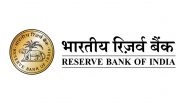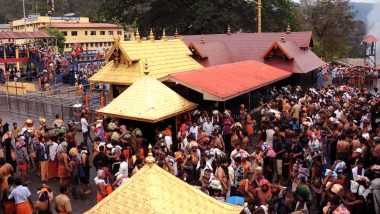New Delhi, January 13: The Supreme Court on Monday said it will not hear review petitions against its verdict allowing entry of women of all ages in Sabarimala temple, clubbed with the entry of women to other places of worship. A nine-judge bench, headed by Chief Justice of India (CJI) Sharad Arvind Bobde, made it clear that the apex court will only hear the seven questions referred to it by the five-judge bench in the Sabarimala case. Sabarimala Temple: No Protection to Women Visiting Lord Ayyappa Shrine, Says Devaswom Board.
"Questions raised in these matters are indeed important. These questions need to be answered," the Supreme Court said. "We won't decide what is incapable of being decided but we will decide everything that can be," it added. The top court further said that all lawyers arguing in the matter will have a consultation for framing issues to be considered by the nine-judge bench. "We don't want unnecessary overlap. Lawyers should decide among themselves what and who will argue which issue and for how long," it said.
Lawyers will have a conference on January 17 for finalising issues. The Secretary General of the Supreme Court will also attend the meeting. The nine-judge bench has been set up after a five-judge bench headed by then CJI Ranjan Gogoi, by a 3:2 majority verdict on November 14, referred to a larger bench the pleas seeking review of the historic September 28, 2018 judgement which had allowed women of all ages to enter the Sabarimala temple.
Sabarimala Verdict 2018: Seven Questions Posed by Five-Judge Bench of Supreme Court
- Clarify the interplay between the freedom of religion under Articles 25 and 26 of the Constitution and other provisions in Part III, particularly Article 14.
- What is the sweep of expression ‘public order, morality and health’ occurring in Article 25(1) of the Constitution?
- The expression ‘morality’ or ‘constitutional morality’ has not been defined in the Constitution. Is it overarching morality in reference to preamble, or limited to religious beliefs or faith? There is a need to delineate the contours of that expression, lest it becomes subjective.
- What is the extent to which the court can enquire into the issue of whether a particular practice is an integral part of the religion or religious practice of a particular religious denomination, or should that be left exclusively to be determined by the head of the section of the religious group?
- What is the meaning of the expression ‘sections of Hindus’ appearing in Article 25(2)(b) of the Constitution?
- Are the “essential religious practices” of a religious denomination, or even a section thereof, afforded constitutional protection under Article 26?
- What would be the permissible extent of judicial recognition to PILs in matters calling into question religious practices of a denomination or a section thereof at the instance of persons who do not belong to such religious denomination?
The top court clubbed the curbs faced by Muslim women in connection with entry to mosques and dargahs and Parsi women, married to non-Parsi men, being discriminated from entering the Fire Temple. There are more than 50 review petitions, which had challenged the judgement of the Supreme Court allowing the entry of women of all ages in the Sabarimala temple in Kerala.
(The above story first appeared on LatestLY on Jan 13, 2020 11:48 AM IST. For more news and updates on politics, world, sports, entertainment and lifestyle, log on to our website latestly.com).













 Quickly
Quickly


